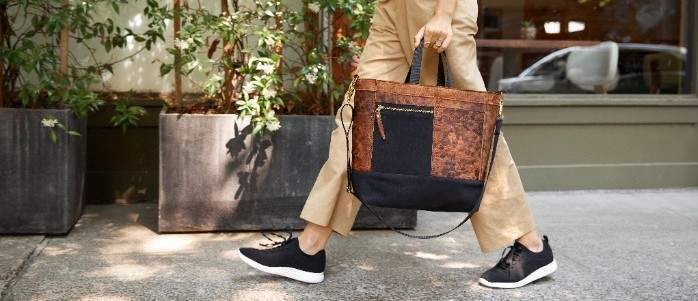
Like fur before it, the use of leather is increasingly controversial among the fashion industry. Real leather is fast falling out of favour with the ethical shopper, with the global synthetic leather market growing fast and set to increase by 50% by 2021. As result, companies are increasingly searching for vegan leather alternatives.
Several big names have championed the use of ‘vegan leather’, with Stella Mccartney announcing this week that she was collaborating with Adidas to create a non-leather version of the popular Stan Smith trainers. Last month, Helsinki Fashion Week announced that it will go leather-free starting in July 2019.

Access deeper industry intelligence
Experience unmatched clarity with a single platform that combines unique data, AI, and human expertise.
From cork to seaweed and even pineapple, numerous companies are seeking out ‘vegan’ alternatives to cow hide. For one company, however, the answer lies with a mushroom-based product called Mylo.
Mylo: the lab-grown vegan leather
With the tagline ‘Animal leather is so 1st century’, ethical fashion brand Bolt Threads has developed a technique using mycelium, the underground root structure of mushrooms. By growing mycelium cells and then compressing them, Bolt Threads has created a material that looks and feels remarkably like leather.
The company is launching a Kickstarter campaign to fund the first commercially available product made from Mylo, with customers soon able to pre-order a bag made in part from the mushroom-based fabric.
The company claims that its product is more environmentally friendly than both leather and plastic-based ‘pleather’ as it avoids both the material waste of using animal hides and the chemicals used in the manufacture of pleather.

US Tariffs are shifting - will you react or anticipate?
Don’t let policy changes catch you off guard. Stay proactive with real-time data and expert analysis.
By GlobalDataAside from mushrooms, Bolt Thread’s other venture is developing a lab-grown alternative to notoriously hard to replicate spider silk. The company has found a way of developing proteins similar to natural silks by fermenting yeast, sugar and water, which can then be spun to make garments.
Last year, the company launched the world’s first ever human-made spider silk consumer product, a knit silk necktie. Bolt Threads assures that no spiders are harmed, or even involved, in the process.
Being derived from natural products, both materials also fit the criteria of not only being vegan, but also not containing plastic. Ethical consumers are becoming increasingly aware of the fact that many so-called vegan fashion brands may in fact be environmentally damaging, with many brands still using plastics in their products.
Like lab-grown meat, lab-grown leather looks like it could be on the rise.
Other vegan leather brands to watch out for
Bolt Threads is not the only company working to bring natural leather alternatives to the mainstream.
Dutch company Rotterdam Fruitleather has a developed a leather-like material made entirely from leftover fruit and vegetables inspired by the vast amounts of produce thrown away by market vendors. After collecting the ‘waste’ from the market, then mashing, drying, boiling and rolling out the fruit, the company has created a durable, leather-like material which can be used to make bags and other leather goods.
Italian brand Vegea also takes its inspiration from fruit. The company uses the skins, stalks and seeds of grapes, all by-products of wine-making, to produce leather goods.
German company Barktex sources traditional Ugandan barkcloth, a leather-like material made from the bark of fig trees, to create clothing, accessories and furniture. In fact, Dolce and Gabanna used a similar material in a catwalk collection.







